Rubio sets sights on Iran in Jerusalem visit
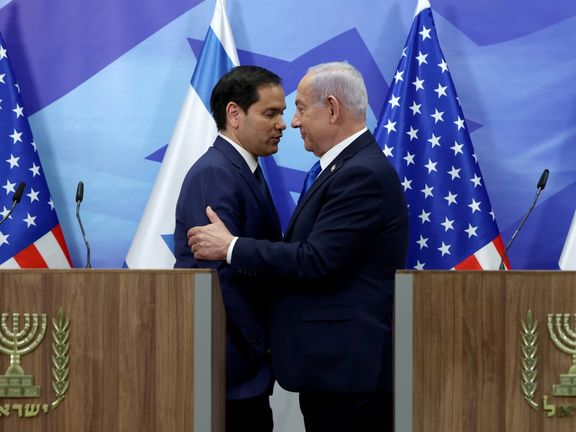
US Secretary of State Marco Rubio said that Iran is the single greatest threat to the Middle East in a joint press conference with Israeli Prime Minister Benjamin Netanyahu in Jerusalem.

US Secretary of State Marco Rubio said that Iran is the single greatest threat to the Middle East in a joint press conference with Israeli Prime Minister Benjamin Netanyahu in Jerusalem.
Rubio said: "Behind every terrorist group, behind every act of violence, behind every destabilizing activity, behind everything that threatens peace and stability for the millions of people that call this region home is Iran.
"And by Iran I mean the ayatollahs, by Iran I mean its regime, a regime who by the way, its people don’t support. The people of Iran are victims of that regime."
Netanyahu, who has long campaigned for harsher policies on Iran from global powers, warning of the threat the country's nuclear program poses to the region, welcomed the comments which echo his own years-long campaign against Tehran.
“Israel and America stand shoulder to shoulder in countering the threat of Iran," he said. "We agree that the ayatollahs must not be allowed to have nuclear weapons. We also agreed that Iran’s aggression in the region has to be rolled back.”
Addressing the Gaza war against Iran-backed militants, Hamas, Netanyahu said Israel had dealt a significant blow to Tehran over the past 16 months, adding that with the support of Trump, "I have no doubt we can and will finish the job".
He also said Israel had weakened the Iranian-backed Hezbollah movement in southern Lebanon and had hit hundreds of targets in Syria to prevent a new Iranian-backed front opening up against Israel.
"Now, if any other force believes that Israel will permit other hostile forces to use Syria as a base of operations against us, they are gravely mistaken," Netanyahu said.
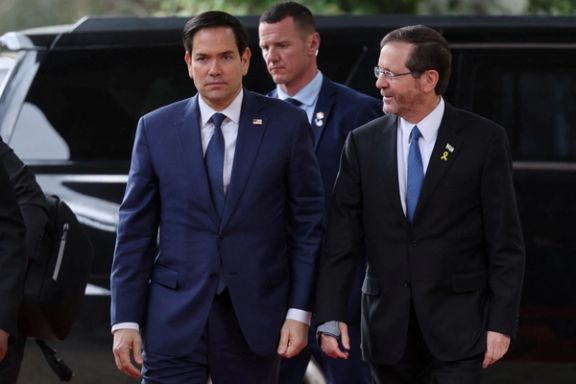
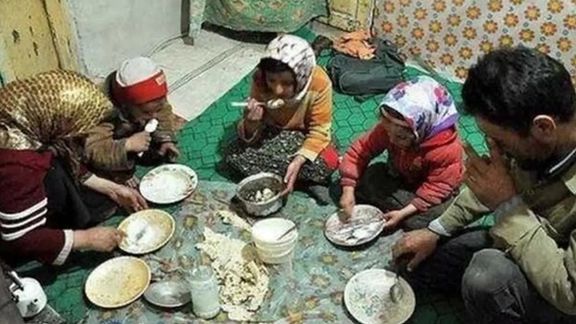
As inflation surges and the value of Iran's currency plunges daily, workers are facing unprecedented economic pressure, with wage negotiations at a standstill.
Mohsen Baghaei, a workers' representative on the Supreme Labor Council, warned of significant price hikes in essential goods over the past two months, with cooking oil increasing by 40%, rice by nearly 100%, and other staples like potatoes and onions also rising steeply.
Baghaei estimated that the average cost-of-living basket for workers has risen by over 30% in just two months, pushing the basket’s value from 300 million rials (around $325) to 380 million rials ($413).
"Inflation on essential goods has been unprecedented," he added, blaming unchecked currency devaluation, corporate hoarding, and a lack of government oversight.
Despite the challenges, wage negotiations remain stagnant. The Supreme Labor Council which is responsible to set minimum wage for the new year starting in March has only convened once since the start of the President Masoud Pezeshkian administration in July, with no meeting held this month.
"While workers expect wages to reflect the cost-of-living basket, the Ministry of Labor’s resistance to this principle has stalled progress."
Currently, the minimum wage set in March 2023 at about 111 million rials ($185 at that time) is worth just $120 due to the rial’s sharp devaluation. With Tehran's estimated living costs exceeding 400 million rials per month, most workers find themselves unable to meet even basic needs and today, at least one third of Iranians are living below the poverty line.
The rising dollar, now valued at around 920,000 rials, has further eroded purchasing power. Shortages of essential goods and inflation nearing 50% compound the crisis, leaving many workers reliant on informal jobs to survive.
The broader economic turmoil has also fueled strikes and protests, including a rare demonstration by Tehran’s historic bazaar merchants last month over soaring currency rates and declining purchasing power.
Baghaei stressed the urgency of implementing realistic wage adjustments based on Article 41 of the Labor Law, which links wages to living costs.
"If the government accepts this legal principle, reaching an agreement won't be difficult," he concluded, while cautioning that lip service without action would only deepen workers’ despair.
Iran’s worsening economic crisis reflects both domestic mismanagement and external sanctions, leaving workers trapped between rising costs and stagnant wages.

The Lebanese government has banned Iranian flights landing in Beirut twice in the last week for fears that Israel may shoot them down, according to AFP.
The US gave warnings to Lebanon that Israel may take military action as Iran-backed Hezbollah continues to use the airport to bring in weapons and money from Iran amid a US-France brokered ceasefire, the report said. Hezbollah and Iran deny the allegations.
A statement on Hezbollah media Al Mayadeen, responded to contest the closure: “Hezbollah demands that the Lebanese government reverse its decision of preventing the Iranian plane from landing at Beirut airport and take serious measures to prevent the Israeli enemy from imposing its dictates and violating sovereignty.”
Hezbollah, designated a terrorist organization by countries such as the US and UK, has been under greater scrutiny since the November ceasefire with Israel has seen the country’s army take greater control under the watch of the US and France which mediated the truce.
Last Thursday, Lebanese authorities sent word to Iran that a Beirut-bound flight should not take off.
On Friday, another flight was banned from taking off from Iran, triggering protests in Lebanon from supporters of the Iran-backed group who blocked the road to the country’s only international airport. The Lebanese army fired tear gas at protesters.
Speaking to AFP, a source said: “Through the Americans, Israel informed the Lebanese state that it would target the airport if the Iranian plane landed in Lebanon.
“The American side told the Lebanese side that Israel was serious about its threat.”
Last year, The Telegraph reported that Beirut International Airport was being used by Hezbollah as a smuggling route for Iran to arm and fund Hezbollah, quoting airport whistleblowers.
The latest incidents would be classed as breaches of the fragile ceasefire, which both sides claim the other has breached dozens of times.
Last week, Lebanese media also reported that flights into Beirut from Iraq were undergoing extra scrutiny to ensure they were not being used by Iran to send cash to Hezbollah.
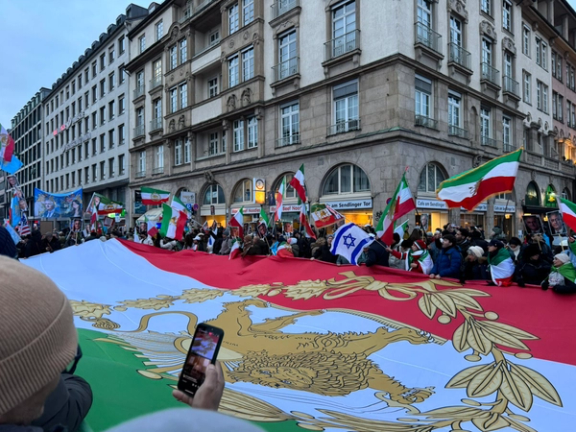
A group of Iranians protested the cancellation of exiled Prince Reza Pahlavi’s speech at the Munich Security Conference (MSC) and to show support for the exiled prince.
The demonstration began at noon on Saturday, with protesters chanting slogans backing Pahlavi and delivering speeches denouncing the decision.
Organizers of the Munich Security Conference, which finishes on Sunday, confirmed to Iran International that the informal invitation to Pahlavi had been withdrawn after discussions with the German government.
“After consultation with the German government, Mr. Heusgen decided not to formalize the invitation to Mr Pahlavi,” they said, noting that Iranian opposition figures had until now, been regular guests.
The German Foreign Ministry acknowledged communication with the MSC but said that decisions on invitations were made independently. A source familiar with the matter told Iran International that Berlin feared Pahlavi’s attendance might jeopardize German dual-national prisoners in Iran.
Pahlavi last participated in the conference in 2023. Dissident journalist and women’s rights activist Masih Alinejad was invited to attend this year.
Earlier this month, the conference reinstated its invitation to Pahlavi after initially withdrawing it due to pressure from the German foreign ministry but then made a u-turn again, retracting the invite for a second time.
On Thursday, the son of Iran’s last king Reza Pahlavi accused the German government of bowing to pressure from Tehran. “This is a betrayal of both the Iranian people and Germany’s democratic values,” Pahlavi wrote on his X social media account.
“This German government has not only silenced the voice of the Iranian people but has actively done the Islamic Republic’s bidding.”
He said that threats from the Islamic Republic had influenced Berlin to retract his invitation to the conference. “The Ayatollah is pulling the strings in Berlin,” he said, adding that Germany’s actions amounted to “outsourcing censorship to Berlin.”
An official X account managed by US-based Pahlavi's office, criticized Germany’s approach, saying, “Instead of supporting those fighting for freedom, Germany has chosen to appease a dictatorship that murders its citizens, takes Europeans hostage, and sponsors terrorism.”
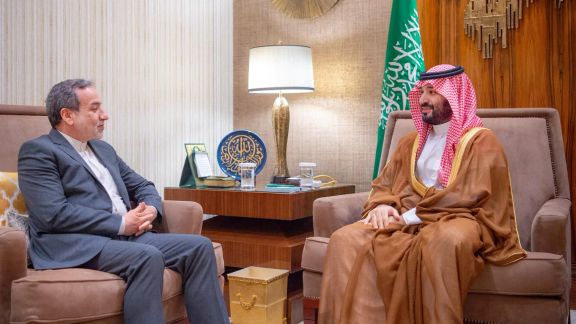
Saudi Arabia is open to mediating between the Trump administration and Iran in pursuit of a new agreement to limit Tehran’s nuclear program, CNN reported on Sunday.
The report said that Riyadh is concerned that Iran may be more inclined to pursue nuclear weapons after the weakening of its allied forces in the Middle East, which had long been seen as a deterrent against Israeli attacks.
Saudi Arabia hopes to leverage its ties with US President Donald Trump to provide Iran with a diplomatic channel to the White House, according to the report.
CNN added that it remains unclear whether Saudi Arabia has made a formal offer, but said the move highlights Riyadh’s efforts to build on its improving relations with Iran and secure a role in any future negotiations.
On Saturday Al-Hadath cited a senior European diplomat saying that if Tehran fails to reach an agreement with the Trump administration before October, Israel will launch a military attack on Iran.
The director general of the UN's nuclear watchdog on Friday said the international community should not waste any more time and should finalize a deal on Iran's nuclear program before it is too late.
Speaking to reporters on the sidelines of the Munich Security Conference, Rafael Grossi said Iran would likely have about 250 kg of uranium enriched to up to 60% by the time of the agency's next report in the coming weeks.
On February 4, Trump signed a directive reviving his so-called maximum pressure policy on Iran from his first term aimed at driving the Islamic Republic's oil exports to zero. After signing the memorandum, he said he would prefer a deal with Tehran to an Israeli attack on their nuclear sites.
"I would love to make a deal with them without bombing them," he said on Fox News.
Following weeks of ambivalent signals regarding negotiations and a struggle in Tehran's political scene, Khamenei finally voiced his opposition to negotiations on February 7, saying talks with the US are "not smart, wise, or honorable."
Iran's President Masoud Pezeshkian also said the country would not yield to external threats.
During last week's state rally marking the anniversary of the 1979 Islamic Revolution, Pezeshkian accused the US of duplicity, saying that Trump called for negotiations while continuing sanctions.
Iran’s Supreme Leader praised the president for rejecting talks with the United States and said Tehran must continue its military progress after Trump’s threat to stop Iran's nuclear program by force.
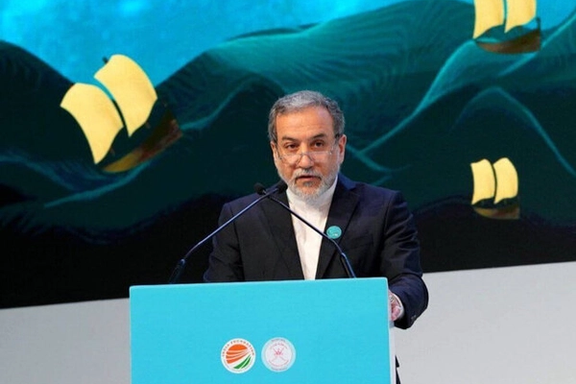
Iran says the future of the Indian Ocean must be decided by its own nations rather than shaped by external powers as Tehran tries to gain further control in the key waterway on its southern coast.
“We cannot allow global geopolitical rivalries to determine the future of this region,” said Foreign Minister Abbas Araghchi at the 8th Indian Ocean Conference in Muscat on Sunday.
He said that some extra-regional actors are exploiting political and security vulnerabilities to disrupt natural cooperation between nations in the region.
“Decisions about the fate of the Indian Ocean must be made by the countries in the region and for the benefit of its people.”
For centuries, the Indian Ocean region has been an important trade arena, stretching from Africa’s eastern coast to Australia’s western coast. It remains critical today for the security and stability of shipping lanes and trade routes.
According to the Carnegie Endowment for International Peace, the area, home to 33 nations and 2.9 billion people, accounts for over one-third of the world’s bulk cargo traffic and two-thirds of the world’s oil shipments and ensures global access to food, precious metals, and energy resources.
Araghchi also spoke about the strategic significance of Iran’s southern coastline, describing the Makran coast as an opportunity that must evolve into an economic hub for both Iran and the region.
Last month, Iran’s government spokesperson announced an ambitious plan to relocate its capital to the southern coastal region of Makran, aiming to address Tehran’s persistent issues of overpopulation, power shortages, and water scarcity. However, the proposal was later denied following extensive criticism.
Araghchi also added that Tehran plays a significant role in combating piracy, drug trafficking, and other threats to trade routes insisting that regional security should be maintained through cooperation among Indian Ocean countries.
His comments of promoting maritime security are contested by incidents like the 2019 tanker attacks near the Strait of Hormuz -- attributed to Iran by the US, UK and Saudi Arabia -- and its seizure of vessels such as the Stena Impero in 2019 and Hankuk Chemi in 2021, which were seen as politically motivated.
Iran-backed Houthis of Yemen are behind most of the attacks on ships in the Red Sea, while Tehran has time and again threatened to close the Strait of Hormuz. Iran was also implicated in incidents like the Israeli-owned Mercer Street tanker attack in 2021.